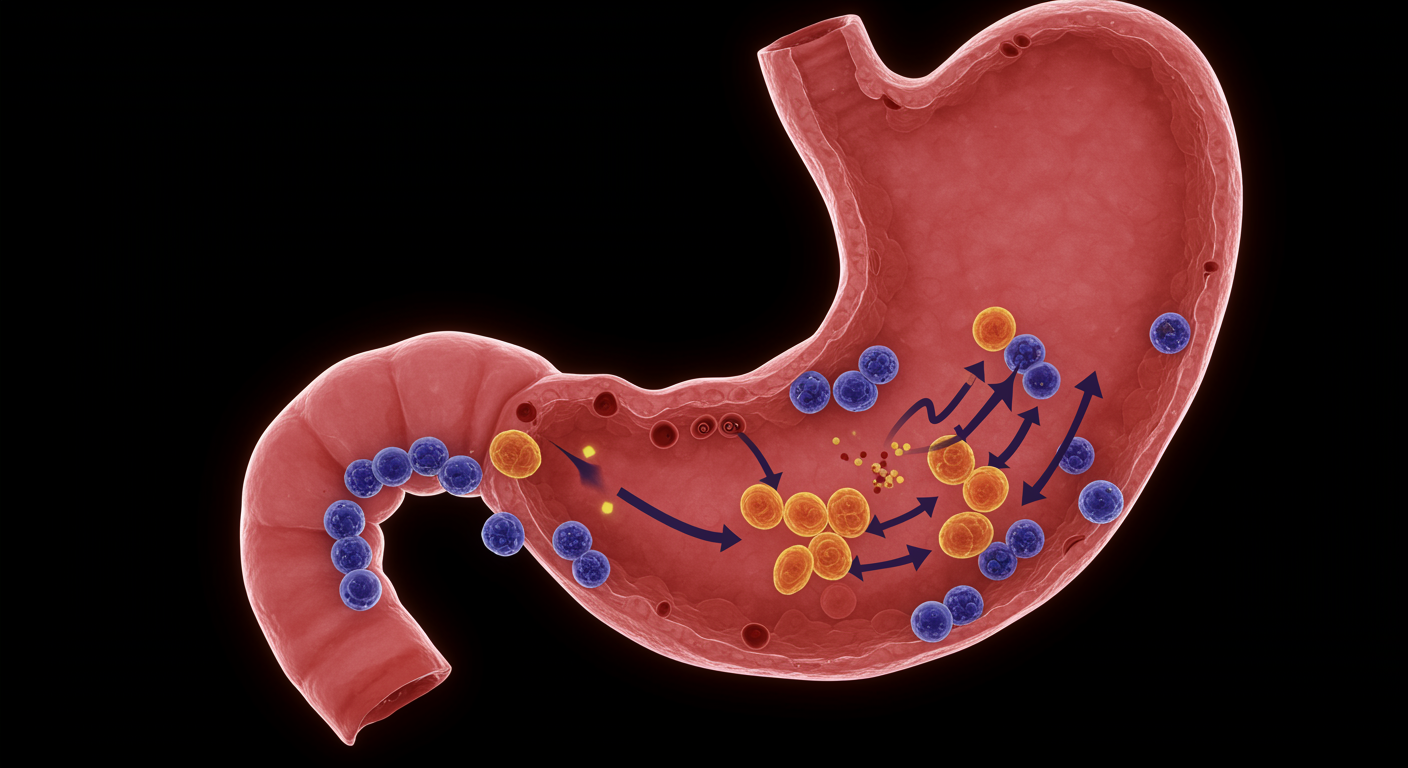What Is Intrinsic Factor and Why Is It Essential for Health?
Intrinsic factor is a glycoprotein produced by gastric parietal cells that is absolutely essential for vitamin B12 absorption in the small intestine. Without adequate intrinsic factor, the body cannot absorb vitamin B12 from food, leading to pernicious anemia and potentially severe neurological complications. This critical protein demonstrates how stomach health directly impacts overall nutrition and highlights why conditions affecting parietal cells can have far-reaching health consequences.
Dr. Kumar’s Take
Intrinsic factor represents one of the most elegant examples of how specialized our digestive system is. This single protein, made only by stomach parietal cells, is the key that unlocks B12 absorption. Without it, you can eat all the B12-rich foods you want and still become deficient. This is why people with stomach surgery, autoimmune gastritis, or long-term PPI use can develop B12 deficiency despite adequate dietary intake. Understanding intrinsic factor helps explain why stomach health is so crucial for overall nutrition.
What the Research Shows
This comprehensive physiological review examines intrinsic factor production, structure, function, and its critical role in vitamin B12 metabolism. The analysis covers the cellular mechanisms of intrinsic factor synthesis, its interaction with vitamin B12, and the complex absorption process that occurs in the terminal ileum.
The research demonstrates that intrinsic factor is not just important but absolutely essential for B12 absorption, with deficiency leading to predictable and severe health consequences that can be prevented through understanding of this physiology.
How This Works (Biological Rationale)
Parietal cells in the gastric fundus and body produce intrinsic factor along with hydrochloric acid. After vitamin B12 is released from food proteins by gastric acid and pepsin, it initially binds to haptocorrin (R-protein) in the stomach. In the duodenum, pancreatic enzymes degrade haptocorrin, allowing B12 to bind to intrinsic factor.
The B12-intrinsic factor complex travels to the terminal ileum, where it binds to specific receptors (cubilin-amnionless complex) and is absorbed through receptor-mediated endocytosis. This highly specific process explains why B12 absorption is so vulnerable to disruption at multiple points along this pathway.
Why This Matters for Health and Performance
Understanding intrinsic factor physiology is crucial for recognizing conditions that can lead to B12 deficiency, including pernicious anemia (autoimmune destruction of parietal cells), gastric surgery, chronic PPI use, and various gastrointestinal disorders. B12 deficiency can cause anemia, neurological symptoms, and cognitive impairment.
This knowledge also explains why oral B12 supplementation may be ineffective in intrinsic factor deficiency, requiring alternative routes like sublingual, nasal, or injectable B12 to bypass the intrinsic factor-dependent absorption pathway.
Safety, Limits, and Caveats
The physiological review focuses on normal intrinsic factor function and may not fully address all pathological conditions affecting its production or function. Individual variations in intrinsic factor production, genetic polymorphisms affecting B12 metabolism, and the complex interactions between various nutrients and medications can influence B12 status.
The research also doesn’t extensively cover the long-term consequences of subclinical B12 deficiency or optimal strategies for monitoring and treating intrinsic factor-related B12 deficiency.
Practical Takeaways
- Recognize that intrinsic factor is essential for B12 absorption and cannot be replaced by dietary changes alone
- Understand that conditions affecting parietal cells can lead to B12 deficiency regardless of dietary intake
- Consider B12 monitoring in patients with gastric surgery, autoimmune conditions, or chronic PPI use
- Be aware that oral B12 supplements may be ineffective in intrinsic factor deficiency
- Appreciate that B12 deficiency can develop slowly and cause subtle neurological symptoms before anemia appears
- Consider alternative B12 delivery methods (sublingual, injectable) when intrinsic factor deficiency is suspected
Related Studies and Research
- Vitamin B12 Intake From Animal Foods, Biomarkers, and Health Aspects
- Physiology, Stomach
- Pharmacology of Proton Pump Inhibitors
- Use of Proton Pump Inhibitors and Risk of Iron Deficiency: Population-Based Study
- Episode 25: The Great GERD Mistake - How Medicine Made Heartburn Worse and How to Fix It
FAQs
What happens if I don’t have enough intrinsic factor?
Intrinsic factor deficiency leads to vitamin B12 deficiency, which can cause pernicious anemia, neurological symptoms, fatigue, and cognitive problems.
Can I get enough B12 without intrinsic factor by eating more B12-rich foods?
No, without intrinsic factor, the body cannot absorb B12 from food regardless of dietary intake - alternative supplementation methods are required.
What conditions can affect intrinsic factor production?
Conditions include pernicious anemia (autoimmune), gastric surgery, chronic PPI use, H. pylori infection, and various gastric disorders affecting parietal cells.
How is intrinsic factor deficiency diagnosed?
Diagnosis typically involves B12 level testing, intrinsic factor antibody tests, and sometimes specialized absorption studies like the Schilling test.
What are the treatment options for intrinsic factor deficiency?
Treatment usually involves B12 injections, high-dose oral B12, sublingual B12, or nasal B12 spray to bypass the intrinsic factor-dependent absorption pathway - consult your healthcare provider for appropriate options.
Bottom Line
Intrinsic factor is an essential gastric protein that enables vitamin B12 absorption, demonstrating the critical connection between stomach health and overall nutrition. Understanding this physiology is crucial for recognizing, preventing, and treating B12 deficiency in various clinical conditions.


